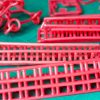As someone who trained and currently still operates as a ‘craftsperson’, debates around manufacturing processes and technological de-skilling became very boring, very quickly. I studied at a well-known Art and Design institution, where the first students to have access to rapid prototyping facilities were within the School of Applied Arts and not on a course allied with architecture, design or engineering. The first time I used a computer to help me produce an object was in 1996, when I wanted to carve something in wax more precisely than my hand-skills would allow. This remains an important point for me in the debate surrounding making things by hand or with digital tools: in many cases digital making processes are used simply to perform tasks that lie outside the skill of the particular producer, and naturally this means that some ‘traditional’ skills die out. This is no different from any other period in history where a new tool has helped us make things faster, more precisely or efficiently. Eventually however, once we evolve beyond novelty parodies of pre- existing artefacts or high-speed mimicry of established techniques, new technologies will open up brand new ways for us to be skilful.
